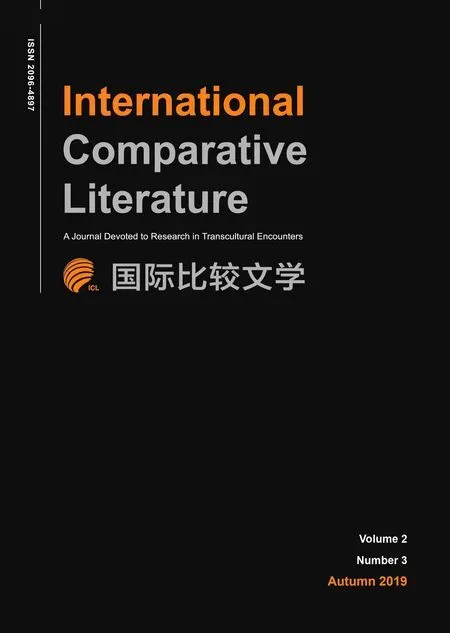Conceison, Claire.Meng Jinghui: I Love XXX and Other Plays.
CUI Xiaoyue
Plays collected inI Love XXX and Other Plays
created by Meng Jinghui fulfilled numerous Chinese audiences’ expectations and have been popular in China for many years.Delightedly, Claire Conceison’s edition of this anthology has finally made “Meng-style” plays available to an English readership.The anthology includes five plays created by Meng Jinghui and translated by different translators, with an introduction which describes Meng Jinghui as a representative of modern spirit, as suggested in the title “Meng Jinghui: Icon and Iconoclast.” It sketches the sociocultural background of the birth of “Meng-style Theatre,” focusing on how Meng Jinghui quests for freedom in artistic creation.His independent attitude and collaborative ways reflected in the form and content of the plays make him an idol.His ability to mix high culture together with mass culture popularized Chinese avant-garde theater.He never tries to please audiences on purpose, but “the less attention he pays to their taste and expectations, the more they like him and his work” (12).He is delighted to see the confusion of the audience after watching obscure plays such asI Love XXX
andHead without Tail
.He insists on the spirit of “ideological self-expression, revolutionary courage, confident humor, relentless pursuit of freedom, and combating mediocrity”(12).Refusing to cater to mediocre taste excludes him from mainstream theatre and drives away some audiences.However, as Conceison illustrates, it is not his purpose to keep a distance from audiences and he also has other productions such asRhinoceros in Love
catering to youth culture andTwo Dogs
’Opinions on Life
relating to real lives.As he said, “his target audience is not ‘the masses,’ but ‘the people,’ which he defines as a subset of the masses that has creative and imaginative ability, opposes oppression and inequality, and pursues human dignity” (12).He not only collaborates with his team members, but also with audiences with creativity and dignity.Resonance in spirit made a growing number of audiences go to his Beehive Theatre and create plays with him.Debuted between 1993 and 2007, the five plays were revised and restaged more than once, suiting for specific performing time and places, and some have still been presented on stage in recent years.Liberating spirit also reflected in experimental form and content of the plays.He “turns traditional works upside down or hacks the classics into pieces, and deconstructs them through the use of cheeky satirical parody” (11).Chinese traditional opera and folk arts such as
Er ren zhuan
二人转 (song-and-dance duet) and western theatre techniques are easily fused in one play.Having no narration of a complete story but more than 600 lines begin with the phrase “I love...,” the title pieceI Love XXX
presented as a Dadaist word gamebecomes so-said China’s first “anti-plot” play.
Longing for Worldly Pleasures
juxtaposes episodes from traditional Kunqu opera and stories in Boccaccio’sDecameron
, in which serious and bawdy materials are combined.Adapted from Mayakovsky’s work,The Bedbug
not only changes the setting from Russia into China’s past and turn-of-the-millennium present, but also adds Beijing dialect and a rock band to remind people of Chinese reality.Flashbacks and lyrical expressions are frequently used inHead without Tail
and some genius plot such as facial reconstruction and identity exchange can find sources in Dario Fo’sTrumpets and Raspberries
and Brecht’sThe Good Person of Szechwan
.Two Dogs
’Opinions on Life
addressing the situation of migrant workers is a satirical comedy seeing the world from dogs’ perspectives.Impromptu lines are added according to the particular day and city of each performance.With more than 2,300 tour performances in 40 cities, it has been seen by over one million audiences, who would find it funny and inspiring.What Meng Jinghui has done in the collected plays is to explore and make people face problems such as confusion of identity and loss of ideals in modern society, and to think of resolutions not only for Chinese youth, but for international society as a whole.As suggested in the title of the book, in which Meng Jinghui’s name is prominently seen, in a directorcentered world today, people would prefer to go to the theatre and cheer up with the director, actors, and actresses, rather than read the script quietly at home.Conquering difficulties in publishing this book requires patience and enthusiasm for theatre.Besides, translating the plays from Chinese into English is not an easy job.Meng Jinghui grew up in a time when Chinese youth loved poetry from their hearts, which makes the lyrical expressions in his plays elliptical and ambiguous.Collaborative improvisation also makes many incidents and implication hard to interpret.Considering the performability, translation serving for possible performance requires concision and action-orientation.However, the project is successfully achieved by the experienced translators, including scholars in the theatre field like Jonathan Noble, Claire Conceison and Wang Chong.Thanks to their effort, readers, theatre lovers, and scholars in the English world get an opportunity to regain the interest of reading worthy plays.
With the convenience of watching TV and going to movies, the popularity of theatre was generally declining in the last 20 years of 20th century.But Meng Jinghui creates a miracle of arousing many people’s interests for theatre.He proves that theatre will never come to an end, as long as it provides audiences the opportunities to use their imagination freely.These plays exert this function to an utmost extent by using highly symbolic, connotative lines and actions that require readers to flesh out in their minds.With the bonus of watching the attached DVD featuring selected scenes from the plays, readers can enjoy a journey of free interpretation and imagination.

